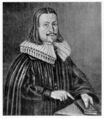Template:Selected anniversaries/July 25: Difference between revisions
No edit summary |
No edit summary |
||
| Line 7: | Line 7: | ||
File:Andreas Libavius.jpg|link=Andreas Libavius (nonfiction)|1616: Physician, alchemist and chemist [[Andreas Libavius (nonfiction)|Andreas Libavius]] dies. He accepted the Paracelsian principle of using occult properties to explain phenomena with no apparent cause, but rejected the conclusion that a thing possessing these properties must have an astral connection to the divine. | File:Andreas Libavius.jpg|link=Andreas Libavius (nonfiction)|1616: Physician, alchemist and chemist [[Andreas Libavius (nonfiction)|Andreas Libavius]] dies. He accepted the Paracelsian principle of using occult properties to explain phenomena with no apparent cause, but rejected the conclusion that a thing possessing these properties must have an astral connection to the divine. | ||
||Johann Benedict Listing (25 July 1808 – 24 December 1882) was a German mathematician. | |||
File:Niles Cartouchian and Egon Rhodomunde Confront Gnotilus.jpg|link=Niles Cartouchian and Egon Rhodomunde Confront Gnotilus|1836: New steganographic analysis of famed illustration ''[[Niles Cartouchian and Egon Rhodomunde Confront Gnotilus]]'' reveals several terabytes of encrypted data. | File:Niles Cartouchian and Egon Rhodomunde Confront Gnotilus.jpg|link=Niles Cartouchian and Egon Rhodomunde Confront Gnotilus|1836: New steganographic analysis of famed illustration ''[[Niles Cartouchian and Egon Rhodomunde Confront Gnotilus]]'' reveals several terabytes of encrypted data. | ||
Revision as of 17:57, 24 July 2017
1616: Physician, alchemist and chemist Andreas Libavius dies. He accepted the Paracelsian principle of using occult properties to explain phenomena with no apparent cause, but rejected the conclusion that a thing possessing these properties must have an astral connection to the divine.
1836: New steganographic analysis of famed illustration Niles Cartouchian and Egon Rhodomunde Confront Gnotilus reveals several terabytes of encrypted data.
1837: The first commercial use of an electrical telegraph is successfully demonstrated in London by William Cooke and Charles Wheatstone.
1842: Physician and surgeon Dominique Jean Larrey dies. He was an important innovator in battlefield medicine and triage, and is often considered the first modern military surgeon.
1864: The well-known illustration Asclepius Myrmidon Prepares for Emergency Field Surgery "is a reasonably accurate depiction of events as I experienced them," Judge Havelock tells interviewer.
1920: Chemist and X-ray crystallographer Rosalind Franklin born. She will make contributions to the discovery of the molecular structure of DNA (deoxyribonucleic acid).
1963: Mathematician and physicist Nicholas Metropolis publishes new class of Gnomon algorithm functions which he derived using the Monte Carlo method. He will soon use these new functions to detect and prevent crimes against mathematical constants.






